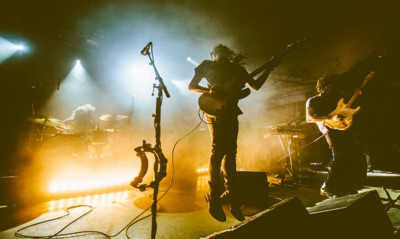
Jack O’Brien, bassist and vocalist of the indie rock band The Bright Light Social Hour, said that his source of musical inspiration is the same as the source of all life — water.
The group’s newest album “Space Is Still the Place” was released earlier this year, and is the centerpiece of the band’s current North American tour that will be stopping in Allston at the Great Scott Thursday.
The Austin, Texas, drought that served as O’Brien’s inspiration lasted for about four years and caused the lake next to his house to be left completely barren.
“We live on a lake and it became and stayed totally bone-dry, and felt like a desert on the moon, it was all exposed white limestone everywhere,” O’Brien wrote in an email. “I think that landscape informed a lot of the sounds from the last record.”
It was not just the lack of water that stood out to the band members, O’Brien said, but also its return.
The richness of life outside his window had all but depleted when Texas was hit in late May with flooding, claiming many homes and lives. The flood did, however, invigorate a new inspiration in the band members.
“[It] feels suddenly like we live on the Mediterranean,” O’Brien wrote. “I think all the new water has made us feel very rich and creative.”
The Bright Light Social Hour’s kaleidoscopic sound is distinguished by experimental layers of both synthesizer and airy vocals. It produces a music that resembles the undiscovered and unacknowledged areas of the mind. It searches for a deeper truth and an imaginative way forward.
O’Brien said that he agrees with the frequent descriptions of the group as “psychedelic,” but also believes that term is too vague.
“We’re always trying to make something that you can’t put a name on,” O’Brien said in a phone call. He also described their music as including elements of rock, dance, soul and house.
The Bright Light Social Hour formed when O’Brien and Curtis Roush, vocalist and guitarist, met at Southwestern University, a small liberal arts school in central Texas. Roush sent a campus-wide email looking to start a band.
“I responded and we hit it off right away,” O’Brien said.
They then made a listing on Craigslist looking for a drummer. Joseph Mirasole responded enthusiastically and eventually introduced O’Brien and Roush to keyboarder Edward Brailif in early 2013.
The new album focuses on what the band calls “Future South.” Touring for almost three years, primarily in the South, and unable to afford hotels, the group lodged with a number of young people who lived and worked in the area. O’Brien said that these encounters opened their eyes to a lot of struggle.
The lives of these young people inspired much of the content in the album. O’Brien said that the album pushes for a new reality — one that looks forward.
“‘Space’ represents a new frontier and an infinite future and I think the message is to keep on pushing for a future that is more egalitarian, more beautiful,” O’Brien said. “That is as the future should be.”
One of the group’s most popular songs, “Infinite Cities,” epitomizes the uprooted lifestyle the band felt while constantly touring and how they were forced to find a home within their movement.
The album took almost two years to complete. It was the first time that the band recorded, engineered and produced entirely by itself. The album launched The Bright Light Social Hour’s biggest tour thus far, beginning this past spring at the album’s release. O’Brien said that this tour is a fresh start for the band with a whole new sound — a new sound that has been received with great enthusiasm thus far.
“We’re always a bit beaten and tired,” O’Brien said, “but we truck on and we always find a little bit of a community that inspires to keep on.”
